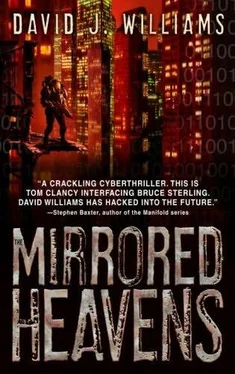“You’re saying that these missiles are hypersonic?” Marlowe doesn’t dare turn and inspect the engines to confirm the claim. “Tell me where you got them, or I am going to kill you.”
“Shoot me if you like, then, Yanqui—” Accepting the invitation, Marlowe lowers his left arm and switches to regular ammo, blowing the man’s right kneecap into splinters. Blood and flesh spray through the air. The man goes down—and then rolls over and looks up at Marlowe. Blood’s pouring from his shattered leg. He’s still smiling. And still speaking as calmly as before.
“My soul has already gone to join my ancestors, Jason Marlowe. But I left my body behind to tell you that the Jaguar of all our souls is even now among us. Ready to purge this land of all who oppress us. Ready to lick clean your bones. Are you listening now, Yanqui?”
“How do you know who I am?” says Jason Marlowe, and thrusts one of his guns into the man’s smiling face. “So help me God, man, you’d better tell me what you’re saying.”
“But I’m saying nothing you can understand.” Spittle flicks onto the barrel of Marlowe’s weapon. “Except for the fact that your people are about to be dealt retribution in full. As for how I know your name—Paynal, He Who Walks Upon the Wind and Carries Their Decrees, has imparted much to me. He has informed me that They have decided that if you can pass Their servant’s test of quickness, then you are worthy to play your part in the final drama.”
“If you keep talking, the next bullet’s going straight through your teeth.” Marlowe knows he shouldn’t even bother to make the threat. He knows that he should kill this man right now. But he also knows that he won’t. Now he’s wondering if he’ll be able to shoot him at all. Somehow this crippled man bleeding on the floor has gained the upper hand.
As if sensing his advantage, the man laughs. “The test of quickness, Yanqui. In your language they call it ‘beating the bullet,’ do they not? But no matter—you’ve already failed it, as you sit here prattling with me. For behold, my spirit-guardians have crossed the threshold and are here to join us—and in mere seconds so will my mortal sentinels.” As the man speaks, Marlowe suddenly senses a presence moving up behind him, creeping in between the blind spots of his sensors. He can even see it—some kind of cat that seems to almost glide around the base of the missile platform, its tensing muscles rippling as it prepares to strike—
Whirling, Marlowe confronts only air—and then instinct saves his life, for instead of drawing up dumbfounded, he keeps moving, diving as his adversary’s knife (replete with powered saw-edges to shear through even heavy armor) flies through the space where his head had been a moment before. Dive seamlessly switches to somersault, leaving him on the floor, firing backward over his head, riddling the man with bullets. The whole action has taken less than two seconds. Whoever he was, this man is now dead.
His comrades, however, are clearly still alive. Marlowe can hear shouts drawing closer—the blaze-battling operation reclaiming this piece of the building. Marlowe leaps to his feet, turns his attention to rigging a hi-ex charge onto the missiles—and discovers that the situation is even worse than he’d thought. Not only are the missiles hypersonic, but so are the payloads: each nose cone contains ten tactical warheads, each one fixed to its own hypersonic motor and capable of acting as an autonomous missile anytime after firing. How many more such missiles might there be in this city, sitting inside a continental defense perimeter that encompasses three-fifths of the U.S. launch infrastructure, each base crouched within its own defenses—defenses that would be hard-pressed to withstand an assault with this kind of weapon from this kind of range…the implications keep on stacking up in Marlowe’s mind, and each is but one pulse in the staccato blast of signals that he’s sending out toward the jet-copters and zeppelins overhead, toward the satellites an instant beyond—but none of them can hear him: Marlowe’s signals are bouncing back upon him. The room’s walls must be lined with something—anything to prevent those outside from probing to discover its contents.
Then two men race into the room. Marlowe scarcely looks up to shoot them down. His bomb-rack tosses more grenades through the doorway through which they’ve come. Then he sets the missile controls to manual, starts the ignition sequence. He starts racing forward, extends the fins on his armor. He sees the walls in front of him begin to slide away, just as he’d hoped they would. Fragments of cityscape glimmer through the heaped mountains of the chem-smoke. He hears thunder roar to life behind him—feels himself seized by his thrusters, hurled forward, out into the city.
He watches the ’scraper falling away behind him, sees a sudden flash blossom behind him as his charge detonates. None of that explosion’s nuclear. The charge was set to destroy those warheads. But the blast must have touched off a Jaguar ammunition cache: because now the walls around the floor where he just was rupture, blast outward, tumble downward even as the whole building totters—and then collapses. It comes down like a house of cards, debris flying up in great chunks as it disappears into the murk below—and Marlowe refuses to think about the innocents he’s just killed, because there might have been still more missiles in that building, and what in God’s name does innocent mean down here anyway?—what did it ever mean?—so he’s just blasting on upward, searing right past other buildings, broadcasting the specs, the situation—everything—to anyone who’ll listen.
This time everyone hears. But no one has time to do a thing about it.
* * *

Like rain falling in reverse: the Operative watches through widened eyes as thousands of missiles rise out of the gloom that swathes Belem-Macapa. The def-grids swing into action: satellites start raining countermeasures down upon those weapons—and upon the city beneath. The Operative winds his vision up and down the scale of magnification, takes in a blaze of lights, takes in the clouds of missiles climbing up the gravity well. Many are winking out of existence. Many are arcing back toward the Earth. Many just keep climbing. The Operative stares transfixed as they move toward him. He can’t see if they’re going to plunge down upon the planet or try to make it all the way to vacuum.
But what he can see is that the city from which they launched is writhing under the def-grids’ barrage. If it was burning before, it’s positively incandescent now. The glow shining through the smoke is visible from space. The Operative can see it without amplification.
Until a shutter slides across the window. The Operative tries to disconnect it. Nothing doing. He curses—and stops cursing as he feels the ship start to rumble. The attitudinal jets are firing. The Antares is turning on its axis. He braces himself for the burn that will send the ship hurtling toward the Moon and as far away from this mess as possible. He waits for it. But the seconds keep on ticking by.

It’s all happening around Haskell. But not in the way she expected. Suddenly the Jaguar net’s diminished: nearly all the terminal nodes vanish. Information flows behind in their wakes—shows the trail of exhaust that’s splattering over the naked faces of the instruments that sit in the physical world, shows Haskell ghost-images of things fast receding, swimming out into the sky that can’t even begin to match the one she’s in. She stares.
Читать дальше














